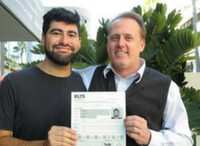Overview
Unlock the door to your dreams and conquer the IELTS exam with confidence through BROWNS English Language School's IELTS Exam Preparation program. Tailored by language experts, our comprehensive curriculum equips you with the essential skills and strategies needed to excel in all sections of the exam. From intensive mock tests to personalised feedback, our experienced instructors will guide you on your path to success. Immerse yourself in a motivating and supportive learning environment, surrounded by like-minded individuals aiming for the same goal. Located in a dynamic city with diverse cultural experiences, BROWNS offers the perfect backdrop for your language journey. Embrace the challenge and secure your future today by enrolling in our IELTS Exam Preparation program. Your success story begins at BROWNS!
Duration: 1 to 20 weeks**(depending on visa)
Course Start Dates: You can start our IELTS Exam Preparation course on any Monday.
Excluding public holidays and school closure periods
(click here)
Campus: Available at our Brisbane, Gold Coast and Melbourne campus.
Mode of Study: On-campus
Student Profile:
- Need to do the IELTS test – Academic or General
- Want practice testing in all four skills
- Prefer intensive language learning
Entry Requirements:
- Strong Intermediate English language level or above
- Minimum IELTS of 5.0 or equivalent
- Student, Working Holiday or Visitor visa
- Verifiable results of a standardised English test or the BROWNS Online Placement Test
- Age: 16 and over
Course Description:
- 20 hours per week in-class and 5 hours per week Accelerate and homework review
- Regular practice tests and tasks that allow students to become familiar with the exam structure and a variety of content
- Feedback and academic counselling that allows students to target specific areas of weakness and ways to improve on them
- Full test every 2 – 3 weeks**
Outcomes:
- Improvement at a rate of .5 of a band score every 10 weeks*
Fees:
CRICOS Code: 091581J
Timetable
Sample Timetables
This should be used as a guide only and may be subject to change at anytime. Our IELTS Exam Preparation course could be scheduled onto any one of the following full time timetables: Click here to see all Sample Timetables.
The IELTS Test
What is the IELTS test?
The International English Language Testing System (IELTS) is an international standardised test of English language proficiency for non-native English language speakers who want to study or work where English is used as the language of communication. The IELTS test assesses all of your English skills — reading, writing, listening and speaking — and is designed to reflect real life use of English — at study, at work, and at play.
Why choose IELTS?
A high IELTS score can open many doors whether you want to study, live or work in Australia. A score of 7 or above would be accepted in just about every area that Australian universities have to offer, from business to science and many others in-between, depending on your goals. In turn, this can help you accelerate your career, while also opening up doors for Australian skills migration.
Other reasons are:
- IELTS is accepted at more than 10,000 organisations globally and is the most respected test of English in the world.
- Almost all universities in Australia, Canada, New Zealand and the UK accept IELTS.
- You can be sure that an IELTS score demonstrates your true ability to communicate in English across all four language skills - reading, writing, listening and speaking.
- IELTS is available at more than 1,100 test centres globally, including 50 test venues in Australia
IELTS test structure:
All candidates must complete four Modules - Listening, Reading, Writing and Speaking - to obtain a band score. The individual scores are then averaged and rounded to produce an Overall Band Score.
All candidates take the same Listening and Speaking Modules, while the Reading and Writing Modules differ depending on whether the candidate is taking the Academic or General Training Versions of the Test.
All candidates take the Listening, Reading and Writing tests all on the same day one after the other, with no breaks in between them. They are always taken in this order. The Speaking test will either be after a break on the same day as the other three tests, or up to seven days before or after that. This will depend on your test centre.
For especific information about the format of each section click here.
IELTS band scale:
There is no pass or fail in IELTS. Candidates are graded on their performance, using scores from 1 to 9 for each part of the test – Listening, Reading, Writing and Speaking. The results from the four parts then produce an Overall Band Score.
Each band corresponds to a level of English competence. All parts of the test and the Overall Band Score can be reported in whole and half bands, eg 6.5, 7.0, 7.5, 8.0.
|
Band 9 |
Expert user: has fully operational command of the language: appropriate, accurate and fluent with complete understanding. |
|
Band 8 |
Very good user: has fully operational command of the language with only occasional unsystematic inaccuracies and inappropriacies. Misunderstandings may occur in unfamiliar situations. Handles complex detailed argumentation well. |
|
Band 7 |
Good user: has operational command of the language, though with occasional inaccuracies, inappropriacies and misunderstandings in some situations. Generally handles complex language well and understands detailed reasoning. |
|
Band 6 |
Competent user: has generally effective command of the language despite some inaccuracies, inappropriacies and misunderstandings. Can use and understand fairly complex language, particularly in familiar situations. |
|
Band 5 |
Modest user: has partial command of the language, coping with overall meaning in most situations, though is likely to make many mistakes. Should be able to handle basic communication in own field. |
|
Band 4 |
Limited user: basic competence is limited to familiar situations. Has frequent problems in understanding and expression. Is not able to use complex language. |
|
Band 3 |
Extremely limited user: conveys and understands only general meaning in very familiar situations. Frequent breakdowns in communication occur. |
|
Band 2 |
Intermittent user: no real communication is possible except for the most basic information using isolated words or short formulae in familiar situations and to meet immediate needs. Has great difficulty understanding spoken and written English. |
|
Band 1 |
Non-user: essentially has no ability to use the language beyond possibly a few isolated words. |
|
Band 0 |
Did not attempt the test: No assessable information provided. |


















